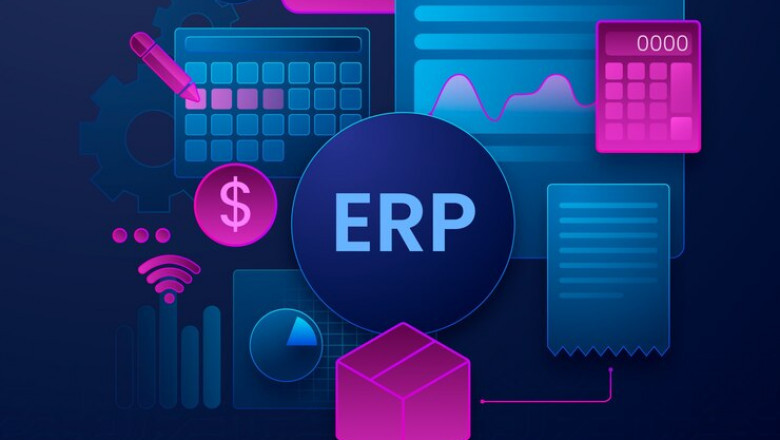views
Introduction
In today's digital-first business landscape, companies across the UAE are turning to ERP software to streamline operations, enhance productivity, and drive growth. Whether you're a startup in Dubai or an established enterprise in Abu Dhabi, implementing the right ERP software in Dubai can revolutionize how you manage finances, inventory, customer relationships, and more.
This ultimate guide explores everything you need to know about ERP solutions, why UAE businesses need them, and how to choose the best ERP software in UAE for your organization.
What Is ERP Software?
ERP (Enterprise Resource Planning) software is an integrated business management platform that connects various departments—finance, HR, supply chain, sales—into one unified system.
Key Features of Modern ERP Systems
✔ Real-time data analytics for smarter decision-making
✔ Automated workflows to reduce manual processes
✔ Multi-company/multi-currency support for UAE businesses
✔ Cloud-based accessibility for remote work capabilities
✔ AI-powered forecasting for inventory and demand planning
Why UAE Businesses Need ERP Software
1. Streamlined Operations Across Locations
-
Connect branches in Dubai, Abu Dhabi, and globally
-
Unified data eliminates departmental silos
2. Compliance with UAE Regulations
-
Automated VAT calculations and reporting
-
WPS (Wage Protection System) integration for payroll
3. Enhanced Customer Experiences
-
360° customer view from CRM integration
-
Faster order processing and delivery tracking
4. Data-Driven Decision Making
-
Customizable dashboards with real-time KPIs
-
Predictive analytics for market trends
5. Cost Savings & Efficiency
-
Reduce inventory waste by 20-30%
-
Cut operational costs through automation
Key Features to Look for in ERP Software Dubai
1. Localized UAE Compliance
-
VAT automation (FTA-approved)
-
Arabic language support
2. Industry-Specific Solutions
-
Retail: POS and omnichannel integration
-
Manufacturing: Production scheduling
-
Construction: Project cost tracking
3. Deployment Options
-
Cloud ERP: Quick implementation, lower upfront costs
-
On-Premise: More control for sensitive data
4. Mobile Accessibility
-
Approval workflows on-the-go
-
Real-time inventory checks
5. Integration Capabilities
-
Connects with existing accounting, HRMS, CRM
Types of ERP Software in UAE
1. Generic ERP Systems
-
Suitable for most industries (e.g., SAP Business One)
2. Industry-Specific ERP
-
Tailored for healthcare, construction, etc.
3. Open-Source ERP
-
Customizable but requires IT expertise
4. Small Business ERP
-
Affordable solutions for startups
Top 5 Best ERP Software in UAE (2024)
1. SAP S/4HANA
✅ Best for: Large enterprises
✅ UAE Advantage: Local compliance, Arabic interface
2. Oracle NetSuite
✅ Best for: Growing businesses
✅ UAE Advantage: Cloud-based, multi-currency
3. Microsoft Dynamics 365
✅ Best for: Microsoft ecosystem users
✅ UAE Advantage: Power BI integration
4. Odoo
✅ Best for: SMEs
✅ UAE Advantage: Affordable modular pricing
5. Zoho ERP
✅ Best for: Startups
✅ UAE Advantage: Easy-to-use interface
How to Choose the Best ERP Software in UAE
1. Assess Your Business Needs
-
List must-have vs. nice-to-have features
2. Consider Total Cost of Ownership
-
Implementation, training, and maintenance costs
3. Check Vendor Reputation
-
Local support availability in Dubai/Abu Dhabi
4. Request Demos & Trials
-
Test usability with your team
5. Plan for Change Management
-
Employee training strategies
Implementation Challenges & Solutions
Challenge 1: Employee Resistance
✅ Solution: Comprehensive training programs
Challenge 2: Data Migration Issues
✅ Solution: Work with experienced implementation partners
Challenge 3: High Initial Costs
✅ Solution: Cloud-based options with monthly payments
Future of ERP in UAE
-
AI-powered automation for smarter processes
-
Blockchain integration for secure transactions
-
IoT connectivity for real-time asset tracking
Conclusion
Choosing the best ERP software in UAE is a strategic decision that impacts every aspect of your business. From multinational corporations in Dubai to SMEs in Sharjah, the right ERP solution can drive efficiency, ensure compliance, and provide a competitive edge.
Ready to transform your business operations? Evaluate your options, consult with ERP experts, and take the first step toward digital transformation today.
FAQs About ERP Software in UAE
1. What's the difference between ERP and accounting software?
-
Accounting software handles finances only, while ERP integrates all business functions.
2. How long does ERP implementation take in UAE?
Typically 3-12 months depending on complexity and customization.
3. Can ERP software handle UAE VAT compliance?
Yes, top solutions like SAP and Oracle include FTA-approved VAT modules.
4. What's the average cost of ERP software in Dubai?
-
SMEs: AED 15,000 - 50,000 annually
-
Enterprises: AED 100,000+
5. Is cloud ERP secure for sensitive financial data?
Reputable providers use enterprise-grade security with UAE data centers.














Comments
0 comment